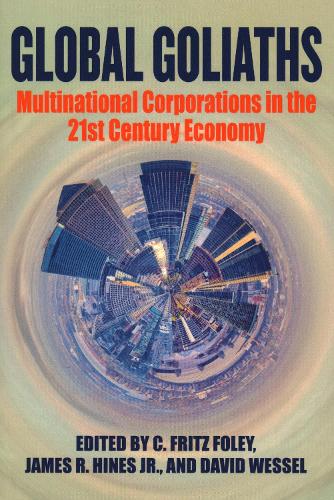
Global Goliaths: Multinational Corporations in the 21st Century Economy
(Paperback)
Publishing Details
Global Goliaths: Multinational Corporations in the 21st Century Economy
By (Author) C. Fritz Foley
Edited by David Wessel
By (author) James R. Hines
Bloomsbury Publishing PLC
Brookings Institution
20th April 2021
United States
Classifications
Professional and Scholarly
Non Fiction
Corporate finance
International economics
International trade and commerce
Public international law: economic and trade
Physical Properties
Paperback
584
Width 155mm, Height 225mm, Spine 39mm
844g
Description
How multinationals contribute, or don't, to global prosperity
Globalization and multinational corporations have long seemed partners in the enterprise of economic growth: globalization-led prosperity was the goal, and giant corporations spanning the globe would help achieve it. In recent years, however, the notion that all economies, both developed and developing, can prosper from globalization has been called into question by political figures and has fueled a populist backlash around the world against globalization and the corporations that made it possible.
In an effort to elevate the sometimes contentious public debate over the conduct and operation of multinational corporations, this edited volume examines key questions about their role, both in their home countries and in the rest of the world where they do business. Is their multinational nature an essential driver of their profits Do U.S. and European multinationals contribute to home country employment Do multinational firms exploit foreign workers How do multinationals influence foreign policy How will the rise of the digital economy and digital trade in services affect multinationals
In addressing these and similar questions, the book also examines the role that multinational corporations play in the outcomes that policymakers care about most: economic growth, jobs, inequality, and tax fairness.
Reviews
Multinational firms are central to the global economyand yet, assertion and anecdote continue to guide too much of our policy conversation about them. This volume's world-class scholars have provided a world-class analysis of the structure and implications of these firms."- Matt Slaughter, Dean, Tuck School of Business, Dartmouth College;
"Are U.S. MNCs us Are they good or bad for the U.S. economy Do they create or destroy jobs Do they avoid taxes by shifting their incomes to low-tax countries This book provides balanced, fact-based answers. Yes, MNCs are good for the U.S. economy, but new policies are needed to ensure that their benefits are broadly shared at home and abroad."- Laura Tyson, Distinguished Professor of the Graduate School, University of California, Berkeley;
"Kudos to the Hutchins Center for undertaking a fact-based study of one of the most important forces in the global economythe multinational corporation. As this volume shows, much of their impact is positive. They have reduced global inequality and increased well-paying jobs in their home countries as well as in less developed countries. But some of it is notin particular, their exploitation of tax havens to undermine any coherency in the global system of taxation."- Alan Murray, CEO, Fortune Media
Author Bio
C. Fritz Foley is the Andr R. Jakurski Professor and senior associate dean for strategic financial planning at Harvard Business School. James R. Hines Jr. is the Richard A. Musgrave Collegiate Professor of Economics and the L. Hart Wright Collegiate Professor of Law at the University of Michigan. David Wessel is a senior fellow in Economic Studies at Brookings and director of the Hutchins Center on Fiscal and Monetary Policy.
